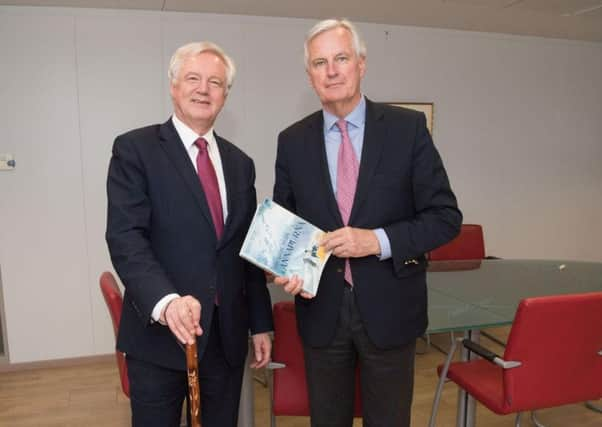EU's Barnier says '˜consequences are substantial' at start of Brexit talks


The Brexit Secretary had wanted the talks to take place in parallel with negotiations on the divorce from Brussels but has now accepted the timetable set out by the EU’s chief negotiator Michel Barnier.
Mr Davis said he was optimistic about the process and the British appeared upbeat about the prospects of trade talks beginning before the final details of divorce proceedings had been agreed.
Advertisement
Hide AdAdvertisement
Hide AdPrime Minister Theresa May spoke to Polish counterpart Beata Szydlo about the negotiations, telling her she wanted a “deep and special partnership that supports a strong and prosperous EU” and stressing her commitment to a deal on the rights of EU citizens.
European Commission official Mr Barnier warned the UK faced “substantial” consequences as a result of Brexit but insisted it was “not about punishment” or revenge.
And in a reference to the Prime Minister’s negotiating mantra, he said: “For both the European Union and the United Kingdom, a fair deal is possible and far better than no deal.”
After the first day of the crucial negotiations which have the potential to shape the UK’s economic and political future for a generation, it was agreed that working groups of officials would aim to make progress on the issues of citizens’ rights, the UK’s financial settlement, the so-called divorce bill, and other issues to do with separation.
Advertisement
Hide AdAdvertisement
Hide AdThe most senior officials on either side will lead work on efforts to resolve the problem of the border between Northern Ireland and the Republic of Ireland, a situation Mr Barnier acknowledged was “politically sensitive” at a time when the Tory government was seeking the support of the Democratic Unionist Party to prop up Mrs May’s minority government.
Only when “sufficient, concrete progress” on the first phase has been made will Mr Barnier recommend to the European Council that the negotiations can enter the next stage, taking in the future trading relationship, with that recommendation possibly coming at October’s summit of EU leaders.
After seven hours of talks in Brussels, Mr Davis, who had previously promised the “row of the summer” over the timetable for the negotiations, remained upbeat.
Both sides acknowledged the clock was ticking, with the date for the UK’s departure from the EU fixed for March 2019.
Advertisement
Hide AdAdvertisement
Hide AdMr Davis denied suggestions the agreed timetable showed Britain’s “weakness” and insisted it is “completely consistent” with the Government’s aim of parallel trade and exit talks.
“It’s not when it starts it’s how it finishes that matters,” he said.
“The UK has been crystal clear in our approach to the negotiations, the withdrawal process cannot be concluded without the future relationship also being taken into account.
“They should be agreed alongside each other, this is completely consistent with the Council’s guidelines which state nothing is agreed until everything is agreed.”
Advertisement
Hide AdAdvertisement
Hide AdMr Davis also brushed off the idea Britain’s negotiating stance could change given political instability in the UK.
The Brexit Secretary said: “The position hasn’t changed.”
Asked if he had given any ground to Britain, Mr Barnier said: “I am not in a frame of mind to make concessions, or ask for concessions.
“It’s not about punishment, it is not about revenge.
“Basically, we are implementing the decision taken by the United Kingdom to leave the European Union, and unravel 43 years of patiently-built relations.”
He added: “The United Kingdom has decided to leave the European Union, it is not the other way around.
Advertisement
Hide AdAdvertisement
Hide Ad“The United Kingdom is going to leave the European Union, single market and the customs union, not the other way around.
“So, we each have to assume our responsibility and the consequences of our decisions.
“And the consequences are substantial.”
In a sign of the progress that has been made, Mr Davis said the Prime Minister would brief fellow EU leaders at a summit on Thursday on the UK’s approach to the rights of expatriate citizens, which will be set out in detail in a paper on Monday.
In a sign of his approach, Mr Davis quoted Sir Winston Churchill’s dictum that “the pessimist sees difficulty in every opportunity. The optimist sees the opportunity in every difficulty”.
Advertisement
Hide AdAdvertisement
Hide AdHe added: “Today marks the start of a journey, for the United Kingdom and for the European Union.
“There is a long way to go, but we are off to a promising start. We have taken the first, critical steps together.
“Now, we have a shared responsibility to deliver quick and substantive progress.”
Mr Barnier and Mr Davis will meet every four weeks over the coming months, bringing their teams together for a matter of days each time.
Advertisement
Hide AdAdvertisement
Hide AdDifferent working groups will negotiate on the issues of expat rights, the financial settlement and other separation issues, while the Irish border will be the subject of a “dialogue” between the senior civil servant at the Department for Exiting the European Union, Olly Robbins, and Mr Barnier’s deputy Sabine Weyand.
Terms of reference agreed by both sides envisage four rounds of talks on the first phase of discussions, in the weeks starting July 17, August 28, September 18 and October 9, implying trade talks are unlikely to open until after the European Council summit of October 18/19.
Both English and French will be used as working languages in negotiations and working documents, and the two sides have agreed a set of principles on the openness of their talks.
The terms of reference state “for both parties the default is transparency” and that it is for the side providing any information to state whether it should remain secret.
“Where possible, both parties will seek to agree public statements relating to negotiating rounds,” the document stated.